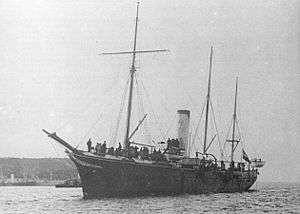SMS Lussin
 SMS Lussin in 1894 | |
| History | |
|---|---|
| Name: | Lussin |
| Builder: |
|
| Launched: | 22 December 1883 |
| Completed: | 12 July 1884 |
| Out of service: | 1928 |
| Fate: | Sold for scrap |
| General characteristics | |
| Displacement: | 995 tons |
| Length: | 262 ft (80 m) |
| Beam: | 27.75 ft (8.46 m) |
| Draught: | 12.5 ft (3.8 m) |
| Propulsion: | 2 × compound steam engines, 4 boilers |
| Sail plan: | Barquentine |
| Speed: | 14.94 knots (27.67 km/h; 17.19 mph) |
| Complement: | 154 |
| Armament: |
|
SMS Lussin was a torpedo cruiser of the Austro-Hungarian Navy. As envisaged by the Navy Commander (Marinekommandant), Admiral Friedrich von Pöck, Lussin would be the leader of a flotilla of torpedo boats, with the additional capability of carrying out scouting duties.
Built by Stabilimento Tecnico Triestino at San Rocco, Lussin was launched on 22 December 1883 and completed 12 July 1884. A vessel of 995 tons displacement, she measured 262 feet 1 inch (79.88 m) in length with a beam of 27 feet 8 inches (8.43 m) and a draft of 12 feet 6 inches (3.81 m). Propulsion was supplied by two compound steam engines with four cylindrical boilers, producing 2,950 horsepower (2,200 kW) for a speed of 14.94 knots (27.67 km/h). The crew comprised 154 officers and men.
Original armament of Lussin consisted of two 15 cm (5.9 in) guns, one 6.6 cm (2.6 in) landing gun and one 13.8-inch (350 mm) torpedo tube, located in the bow below water. The 15 cm guns were mounted on barbettes, one forward between the bridge and the raised forecastle and the other aft; armored bulwarks had to be lowered to allow firing. In 1887 four 4.7 cm (1.9 in) quick-firing guns were added.
Lussin's barquentine rig and elegant lines were more appropriate for a steam yacht of the day. Indeed, experience with previous torpedo cruisers, Zara, Spalato and Sebenico, showed they were too slow and too lightly armed for their intended employment.
Even before completion of Lussin, a change in naval leadership spelled the end of the torpedo cruiser program. The new Navy Commander, Vice Admiral Maximilian Daublebsky von Sterneck, proposed a more capable type of cruiser with a reinforced bow for ramming, a respectable gun armament, and sufficient speed for employment with torpedo craft as well as with the fleet or on detached service. Daublebsky called the new type a torpedo ram cruiser.
Since a role had to be found for Lussin, she was disarmed in 1890 and relegated to use as a training ship for stokers. In 1910 she was converted to an admiralty yacht and re-engined with MAN diesels of 3,255 horsepower (2,427 kW), giving a speed of 14.7 knots (27.2 km/h). Lussin became an accommodation ship at Pola for German submarine crews in 1916.
Ceded to Italy in 1920, Lussin was renamed Sorrento and rearmed with four 7.6 cm (3.0 in) anti-aircraft guns. She was recommissioned on 11 September 1924 as a depot ship for motor torpedo boats with a crew of 45 officers and men. Sorrento was discarded in 1928 and sold for scrap.
References
- Jane's Fighting Ships 1914.
- Conway's All the World's Fighting Ships 1906-1921.